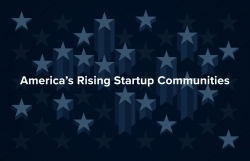Center for American Entrepreneurship Releases Analysis of America’s Startup Communities
The Center for American Entrepreneurship (CAE), a nonpartisan research, policy, and advocacy organization, today released a ground-breaking analysis of the geographic distribution of first-round venture capital financing of early-stage startups.

Washington, DC, July 31, 2018 --(PR.com)-- In recent years, there has been increased interest in and focus on entrepreneurship clusters in areas outside of the well-known coastal startup hubs such as San Francisco, Silicon Valley, Boston, and New York. Investors like Steve Case and Brad Feld are betting on companies outside Silicon Valley, predicting that “the rise of the rest” will level the entrepreneurial playing field and make startup communities more prevalent throughout the country.
To test this notion, Ian Hathaway, research director at the Center for American Entrepreneurship, has analyzed eight years of “first financing” venture capital investments in high-growth early-stage startups across the country.
Are startup hubs spreading across America? The evidence is encouraging, but with layers of nuance and reason for both optimism or pessimism.
More early-stage startups in more metro areas are getting funded compared to eight years ago. But, there has also been a contraction in that growth over the last few years. A plurality of metros participated in that national decline and the leading startup hubs still garner most first financings – even slightly expanding their share. While a rising tide may be lifting more boats, it appears to be lifting the biggest boats the most.
“Reasonable people can interpret these data differently, but I still believe the story is a positive one – with more startups in more cities accessing venture capital compared to a decade ago,” said Hathaway. “A brief post-financial crisis period of over-exuberance is moderating and the early-stage funding market seems to be moving toward a more stable yet geographically inclusive path forward.”
“Startup communities take time to develop,” Hathaway continued. “The data suggest that progress will be non-linear and that the scope could be narrower than many would hope for. History suggests that the establishment of startup hubs must be thought of in terms of decades, not years, and there are limits to the number of cities that will ultimately emerge.”
Full Report
The full report can be found at http://www.startupsusa.org/americas-rising-startup-communities/. CAE welcomes press, bloggers, policymakers, scholars, think tanks, and other interested parties to use and reference our report with attribution as: “Source: America’s Rising Startup Communities, Center for American Entrepreneurship, July 2018.”
About the Center for American Entrepreneurship (CAE)
The Center for American Entrepreneurship (CAE) is a nonpartisan, Washington, DC area-based 501(c)(3) research, policy, and advocacy organization. CAE’s mission is to engage policymakers in Washington, and at state and local levels across the nation, regarding the critical importance of entrepreneurs and startups to innovation, economic growth, and job creation – and to pursue a comprehensive policy agenda intended to significantly enhance the circumstances for new business formation, survival, and growth.
For more information, visit StartupsUSA.org
Follow CAE on Twitter: @StartupsUSAorg
To test this notion, Ian Hathaway, research director at the Center for American Entrepreneurship, has analyzed eight years of “first financing” venture capital investments in high-growth early-stage startups across the country.
Are startup hubs spreading across America? The evidence is encouraging, but with layers of nuance and reason for both optimism or pessimism.
More early-stage startups in more metro areas are getting funded compared to eight years ago. But, there has also been a contraction in that growth over the last few years. A plurality of metros participated in that national decline and the leading startup hubs still garner most first financings – even slightly expanding their share. While a rising tide may be lifting more boats, it appears to be lifting the biggest boats the most.
“Reasonable people can interpret these data differently, but I still believe the story is a positive one – with more startups in more cities accessing venture capital compared to a decade ago,” said Hathaway. “A brief post-financial crisis period of over-exuberance is moderating and the early-stage funding market seems to be moving toward a more stable yet geographically inclusive path forward.”
“Startup communities take time to develop,” Hathaway continued. “The data suggest that progress will be non-linear and that the scope could be narrower than many would hope for. History suggests that the establishment of startup hubs must be thought of in terms of decades, not years, and there are limits to the number of cities that will ultimately emerge.”
Full Report
The full report can be found at http://www.startupsusa.org/americas-rising-startup-communities/. CAE welcomes press, bloggers, policymakers, scholars, think tanks, and other interested parties to use and reference our report with attribution as: “Source: America’s Rising Startup Communities, Center for American Entrepreneurship, July 2018.”
About the Center for American Entrepreneurship (CAE)
The Center for American Entrepreneurship (CAE) is a nonpartisan, Washington, DC area-based 501(c)(3) research, policy, and advocacy organization. CAE’s mission is to engage policymakers in Washington, and at state and local levels across the nation, regarding the critical importance of entrepreneurs and startups to innovation, economic growth, and job creation – and to pursue a comprehensive policy agenda intended to significantly enhance the circumstances for new business formation, survival, and growth.
For more information, visit StartupsUSA.org
Follow CAE on Twitter: @StartupsUSAorg
Contact
Center for American Entrepreneurship
John Dearie
(202) 821-9448
http://www.startupsusa.org/
John Dearie
(202) 821-9448
http://www.startupsusa.org/
Categories
